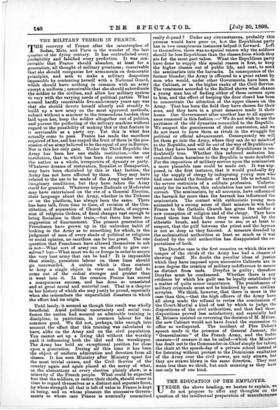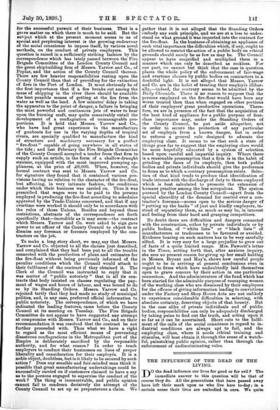THE EDUCATION OF THE EMPLOYER.
UNDER the above heading, we hasten to explain, we do not propose to offer any thoughts on the question of the intellectual preparation of manufacturers for the successful pursuit of their business. That is a grave matter on which there is much to be said. But the subject which at the present moment seems to us of special and perplexing interest is the growing endeavour of the social conscience to impose itself, by various novel methods, on the conduct of private employers. This question is raised in a sufficiently striking fashion by the correspondence which has lately passed between the Fire Brigade Committee of the London County Council and the great shipbuilding firm of Messrs. Yarrow and Co., of Poplar, and the action of the County Council thereon. There are few heavier responsibilities resting upon the County Council than that of providing for the extinction of fires in the Port of London. It must obviously be of the first importance that if a fire breaks out among the mass of shipping in the river there should be available the best possible means of getting at the fire from the water as well as the land. A few minutes' delay in taking the apparatus to the point of danger, a failure in bringing the most powerful and continuous jets of water to bear upon the burning craft, may quite conceivably entail the development of a conflagration of unmanageable pro- portions. It is held that Messrs. Yarrow and Co., who have had great experience in the manufacture of gunboats for use in the varying depths of tropical rivers, are specially qualified to manufacture the kind of structure and machinery necessary for a perfect " fire-float " capable of going anywhere in all states of the tide ; and last February the Fire Brigade Committee of the County Council accepted a, tender from that firm to supply such an article, in the form of a shallow-draught steamer, equipped with the most improved pumping ap- pliances, at the price of £8,000. When, however, the formal contract was sent to Messrs. Yarrow and Co. for signature they found that it contained various pro- visions having no relation to the character of the fire-float, but affecting, in very intimate fashion, the conditions under which their business was carried on. Thus it was prescribed that wages were to be paid to the persons employed in producing the fire-float according to schedules approved by the Trade-Unions concerned, and that if any overtime were worked it should only be in accordance with the rules of those Unions. Besides and beyond these restrictions, abstracts of the correspondence set forth specifically that—incredible as it may seem—the contract which Messrs. Yarrow and Co. were asked to sign gave power to an officer of the County Council to object to or dismiss any foreman or foremen employed by the con- tractors on the job.
To make a long story short, we may say that Messrs. Yarrow and Co. objected to all the clauses just described, and complained that they had been put to all the trouble connected with the production of plans and estimates for the fire-float without being previously informed of the peculiar conditions which the Council would attach to their fulfilment of the contract if they obtained it. The Clerk of the Council was instructed to reply that it was matter of " public notoriety " that in all its con- tracts that body insisted on clauses regulating the pay- ment of wages and hours of labour, and was bound to do so by its Standing Orders. Messrs. Yarrow and Co. rejoined tartly that they had made no study of municipal politics, and, in any case, preferred official information to public notoriety. The correspondence, of which we have indicated the leading features, came before the County Council at its meeting on Tuesday. The Fire Brigade Committee do not appear to have suggested any attempt at compromise with Messrs. Yarrow and Co., and on their recommendation it was resolved that the contract be not further proceeded with. Thus what we have a right to regard as the most efficient means of preventing disastrous conflagrations in the Metropolitan port of the Empire is deliberately sacrificed by the responsible authority, and for what reason ? In order to teach employers to conduct their businesses on lines of proper liberality and consideration for their employes. It is a noble object, doubtless, but is it likely to be secured by such action ? Does any sensible and fair-minded man think it possible that great manufacturing undertakings could be successfully carried on if customers claimed to have a say as to the persons engaged to supervise the conduct of the work ? The thing is inconceivable, and public opinion .cannot fail to condemn decisively the attempt of the County Council to set up so preposterous a claim. We gather that it is not alleged that the Standing Orders embody any such principle, and we are at a loss to under- stand on what ground it was imported into the contract for the fire-float. In the business of obtaining an appliance of such vital importance the difficulties which, if any, ought to be allowed to restrict the action of a public body on ethical grounds should surely be as few as may be. The Council appear to have magnified and multiplied them in a. manner which can only be described as reckless. For our part, we cannot but think that the case in question places the whole policy of the enforcement of fair-wage and overtime clauses by public bodies on contractors in a- doubtful light. It is not alleged that Messrs. Yarrow and Co. are in the habit of treating their employtSs illiber- ally,—indeed, the contrary seems to be admitted by the Daily Chronicle. There is no reason to suppose that the persons employed on the fire-float would have been any worse treated then than when engaged on other portions of their employers' great productive operations. There- fore, we are in presence of the fact that the acquisition of the best kind of appliance for a public purpose of first- class importance may, under the Standing Orders of the County Council, be put aside altogether, not in order to secure the protection of any particular set of employes from a known danger, but in order to enforce a general rule designed to educate the employing class. It seems to us that such a state of things goes far to suggest that the employing class would be more hopefully educated by a system of selection, based upon careful and impartial inquiry. Where there- is a reasonable presumption that a firm is in the habit of grinding the faces of its employes, then both public bodies and private individuals should give the preference to firms as to which a contrary presumption exists. Selec- tion of that kind tends to produce that identification of trade interest with the discharge of duty to those employed which is best calculated to promote the extension of humane practice among the less scrupulous. The system pursued by the London County Council—apart from the special absurdity of the demand for control over a, con- tractor's foreman—seems open to the serious danger of "putting up the backs " of just and kindly employers, in- stead of separating them, as much as may be, in interest and feeling from their hard and grasping competitors.
No doubt there are difficulties and dangers connected with the construction, either by private individuals or by public bodies, of " white lists" or " black lists " of manufacturers or tradesmen to be favoured or avoided. Evidence bearing on such matters has to be very carefully. sifted. It is very easy for a large prejudice to grow out of facts of a quite limited range. Mrs. Fawcett's letter in the Times, setting forth that, after anxious inquiry, she sees no present reason for giving up her small holding in Messrs. Bryant and May's, shows how careful people ought to be in arriving at general conclusions even in regard to firms which have undoubtedly laid themselves open to grave censure by their action in one particular connection. And the administrators of the fund which has been started for the admirable purpose of recouping women of the working class who are dismissed by their employers for the offence of giving information leading to convictions- under the Factory and Shop Hours Acts are not unlikely to experience considerable difficulties in selecting, with absolute certainty, deserving objects of that bounty. But in the case alike of private individuals and of public bodies, responsibilities can only be adequately discharged by taking pains to find out the truth, and acting upon it so far as it can be ascertained. Short cuts to the fulfil- ment of the calls of the social conscience in regard to in- dustrial conditions are always apt to fail, and the employing class, where it needs ethical training and stimulus, will best obtain it through the sense of a watch- ful, painstaking public opinion, rather than through the- enforcement of undiscriminating rules.



































 Previous page
Previous page